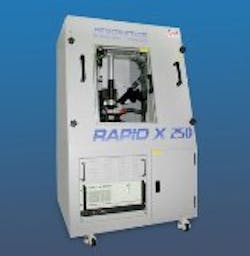Resonetics releases RapidX250 rapid prototype tool
Resonetics, Nashua, N.H., has introduced the RapidX250 laser micromachining system, developed for universities and corporate research to fabricate microfluidic, MEMS and medical devices in a rapid prototype fashion with tolerances approaching 1 micron.
Traditionally MEMS devices are fabricated by traditional semiconductor lithography, but the multi-step process takes significant time. The RapidX250 uses a multi-wavelength excimer laser (193nm and 248nm) to directly fabricate the structures in a single step, drastically reducing prototype time.
Compared with other lasers and methods, the RapidX250 is very flexible, able to micro fabricate 2-D (flat sheets, tubes) and 3-D parts (balloons, non-planar surfaces), including XYZ, theta, and goniometer. At 193nm laser wavelength, the laser can ablate cleanly fluropolymers (such as nylon, pebax, Teflon), bioabsorbable polymers, and glass.
The system has a quick exchange scheme to allow the user to switch to 248nm laser wavelength, useful for machining polymers, ceramic and metals (such as stents). The RapidX250 was designed to be user friendly with a DXF file-to-CNC converter to quickly convert concepts into prototypes, ideal for a multi-user environment.
